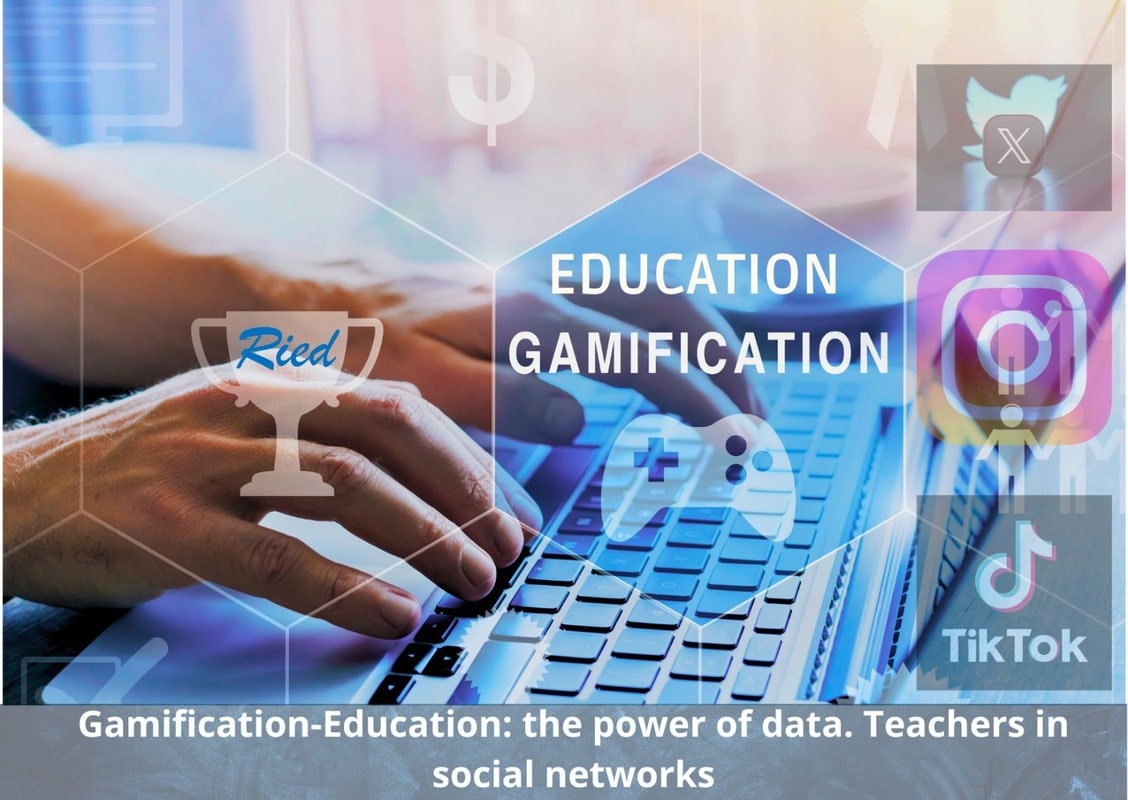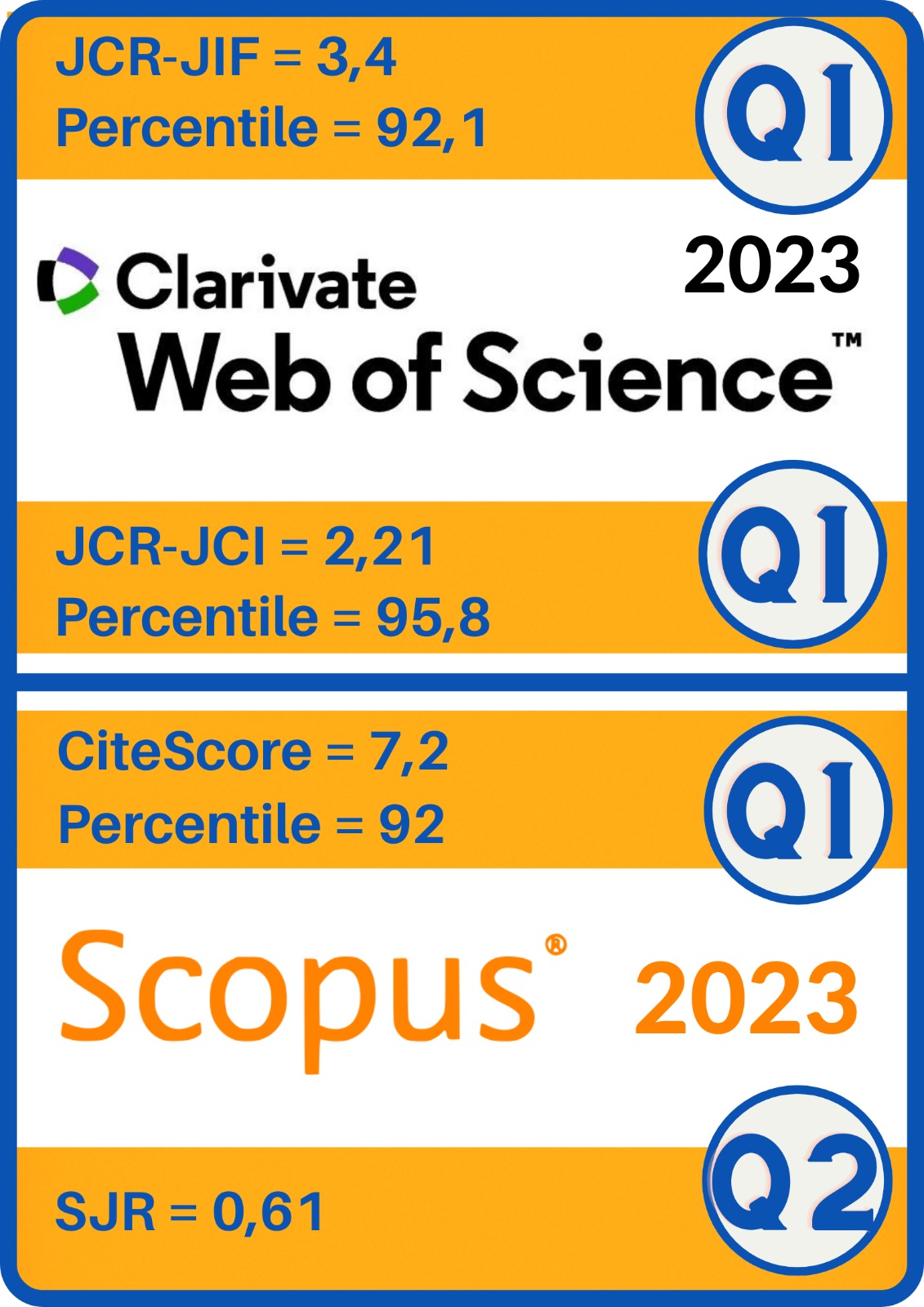Gamification-Education: the power of data. Teachers in social networks
DOI:
https://doi.org/10.5944/ried.27.1.37648Keywords:
Social network, education, Big data, gamification, teaching staffAbstract
Social networks are spaces for teachers to exchange content on new methodological approaches to gamification, raising questions about the integration of gamification in current and future digital trends. The present research aims to determine the behaviour of posts with gamification content on the social networks Twitter, Instagram and TikTok. Web scraping techniques for Instagram and TikTok, together with the Twitter API, collect 189,414 posts with the keywords gamification and education in Spanish and English during the year 2022. These large volumes of data are made available to stakeholders through Microsoft Power Business Intelligence. Using deliberative sampling, an in-depth analysis of the 100 most viral posts on each social network was conducted to respond to the research objective. The results highlight the presence of teachers on social networks, predominantly on Instagram for the Primary Education stage, and the influence of gender on the posts. The male gender has a greater number of followers and posts, but the female gender has followers with a greater number of likes. Commercial interests in the gamification theme are accentuated in digital trends, although they are lower in comparison to sharing non-profit resources. It is concluded that teaching staff who use social networks become emerging agents in the design of materials and, therefore, mediators between the curriculum and practice.
FULL ARTICLE:
https://revistas.uned.es/index.php/ried/article/view/37648/28240
Downloads
References
Almeida, F., & Simoes, J. (2019). The role of serious games, gamification and industry 4.0 tools in the education 4.0 paradigm. Contemporary Educational Technology, 10(2), 120-136. https://doi.org/10.30935/cet.554469
Almeida, C., Kalinowski, M., Uchôa, A., & Feijó, B. (2023). Negative effects of gamification in education software: Systematic mapping and practitioner perceptions. Information and Software Technology, 156, 107142. https://doi.org/10.1016/j.infsof.2022.107142
Barroso-Moreno, C., Rayon-Rumayor, L., & Bautista García-Vera, A. (2023). Big Data and Business Intelligence on Twitter and Instagram for digital inclusion. Comunicar, 74, 49-60. https://doi.org/10.3916/C74-2023-04
Bourkoukou, O., & El-Bachari, E. (2022). A big data-oriented recommendation method in E-Learning environment. International Journal of Emerging Technologies in Learning, 17(10). https://doi.org/10.3991/ijet.v17i10.27861
Buckley, P., & Doyle E. (2016). Gamification and student motivation. Interactive Learning Environments, 24(6), 1162-1175. https://doi.org/10.1080/10494820.2014.964263
Calvera-Isabal, M., Santos, P., Hoppe, H., & Schulten, C. (2023). How to automate the extraction and analysis of information for educational purposes. Comunicar, 74, 23-35. https://doi.org/10.3916/C74-2023-02
Deng, X., & Yu, Z. (2023). An extended hedonic motivation adoption model of TikTok in higher education. Education and Infoormation Technologies. https://doi.org/10.1007/s10639-023-11749-x
Ezquerra, A., Agen, F., Rodríguez-Arteche, I., & Ezquerra-Romano, I. (2022). Integrating artificial intelligence into research on emotions and behaviors in science education. Eurasia Journal of Mathematics, Science and Technology Education, 18(4), em2099. https://doi.org/10.29333/ejmste/11927
García-Carretero, R., Vigil-Medina, L., Barquero-Perez, O., Mora-Jimenez, I., Soguero-Ruiz, C., & Ramos-Lopez, J. (2021). Machine learning approaches to constructing predictive models of vitamin D deficiency in a hypertensive population: a comparative study. Informatics for Health and Social Care, 46(4), 355-369. https://doi.org/10.1080/17538157.2021.1896524
González-Serrano, L., Talón-Ballestero, P., Muñoz-Romero, S., Soguero-Ruiz, C., & Rojo-Álvarez, J. L. (2021). A big data approach to customer relationship management strategy in hospitality using multiple correspondence domain description. Applied Sciences, 11(1), 256. https://doi.org/10.3390/app11010256
Gorman, K., Hirt, A., Noderer, D., Pearson, M., Rowland-Jones, J., Ryan, D., Sirpal, A., & Woody, B. (2020). Introducing Microsoft SQL Server 2019: Reliability, scalability, and security both on premises and in the cloud. Packt Publishing Ltd.
Hristova, D., & Lieberoth, A. (2021). How socially sustainable is social media gamification? A look into Snapchat, Facebook, Twitter and Instagram. In A. Spanellis & J. T. Harviainen (Eds.), Transforming Society and Organizations through Gamification (pp. 225-245). Palgrave Macmillan. https://doi.org/10.1007/978-3-030-68207-1_12
Hu, H., Zhang, G., Gao, W., & Wang, M. (2020). Big data analytics for MOOC video watching behavior based on Spark. Neural Computing and Applications, 32, 6481-6489. https://doi.org/10.1007/s00521-018-03983-z
Kim, S., Song, K., Lockee, B., & Burton, J. (2018). What is gamification in learning and education? En S. Kim, K. Song, B. Lockee y J. Burton (Coords.), Gamification in learning and education. Advances in Game-Based Learning (pp. 25-38). Springer. https://doi.org/10.1007/978-3-319-47283-6_4
Klašnja, A., Ivanović, M., & Budimac, Z. (2017). Data science in education: Big data and learning analytics. Computer Applications in Engineering Education, 25, 1066-1078. https://doi.org/10.1002/cae.21844
Knight, D., Knight, B., Pearson, M., Quintana, M., & Powell, B. (2018). Microsoft Power BI Complete Reference: Bring your data to life with the powerful features of Microsoft Power BI. Packt Publishing Ltd.
Ladislav, O., Pavel, M., Pitrová, J., Bouda, P., Gresham, G., Balcarová, T., & Rojík, S. (2019). Education and Business as a key topics at the Instagram posts in the area of Gamification. Journal on Efficiency and Responsibility in Education and Science, 12(1), 26-33. https://doi.org/10.7160/eriesj.2019.120103
Lozano-Blasco, R., Mira-Aladrén, M., & Gil-Lamata, M. (2023). Social media influence on young people and children: Analysis on Instagram, Twitter and YouTube. Comunicar, 74, 125-137. https://doi.org/10.3916/C74-2023-10
Mahmud, S., Husnin, H., & Tuan Soh, T. (2020). Teaching presence in online gamified education for sustainability learning. Sustainability, 12, 3801. https://doi.org/10.3390/su12093801
Marín, D., Cuevas, N., & Gabarda, V. (2021). Competencia digital ciudadana: análisis de tendencias en el ámbito educativo. RIED-Revista Iberoamericana De Educación a Distancia, 24(2), 329-349. https://doi.org/10.5944/ried.24.2.30006
Nespor, J. (2019). Cyber schooling and the accumulation of school time. Pedagogy, Culture & Society, 27(3), 325-341. https://doi.org/10.1080/14681366.2018.1489888
Nolan, J., & McBride, M. (2014). Beyond gamification: reconceptualizing game-based learning in early childhood environments. Information, Communication & Society, 17(5), 594-608. https://doi.org/10.1080/1369118X.2013.808365
Rodríguez-Ibáñez, M., Gimeno-Blanes, F. J., Cuenca-Jiménez, P. M., Soguero-Ruiz, C., & Rojo-Álvarez, J. L. (2021). Sentiment analysis of political tweets from the 2019 Spanish elections. IEEE Access, 9, 101847-101862. https://doi.org/10.1109/ACCESS.2021.3097492
Roig-Vila, R., & Álvarez Herrero, J. F. (2019). Repercusión en Twitter de las metodologías activas ABP, Flipped Classroom y Gamificación. RIED-Revista Iberoamericana de Educación a Distancia, 22(2), pp. 79-96. https://doi.org/10.5944/ried.22.2.23272
Sailer, M., & Homner, L. (2020). The gamification of learning: a meta-analysis. Educational Psychology Review, 32, 77-112. https://doi.org/10.1007/s10648-019-09498-w
Salas-Rueda, R. A. (2021). Students’ perceptions of the use of the flipped classroom during the educational process of linear functions. Culture and Education, 33(3), 431-454. https://doi.org/10.1080/11356405.2021.1949109
Samad, S., Nilashi, M., & Ibrahim, O. (2019). The impact of social networking sites on students’ social wellbeing and academic performance. Education and Information Technologies, 24, 2081-2094. https://doi.org/10.1007/s10639-019-09867-6
Sánchez-Rivas, E., Ruiz-Palmero, J., & Sánchez-Rodríguez, J. (2019). Gamification of assessments in the natural sciences subject of primary education. Educational Sciences: Theory & Practice, 19(1), 95-111. https://doi.org/10.12738/estp.2019.1.0296
Terlutter, R., & Capella, M. (2013). The gamification of advertising: Analysis and research directions of in-game advertising, advergames, and advertising in social network games. Journal of Advertising, 42(2-3), 95-112. https://doi.org/10.1080/00913367.2013.774610
Toda, A. M., Valle, P. H., & Isotani, S. (2018). The dark side of gamification: An overview of negative effects of gamification in education. In A. I. Cristea, I. I. Bittencourt, & F. Lima (Eds.), Communications in Computer and Information Science (pp. 143-156). Springer. https://doi.org/10.1007/978-3-319-97934-2_9
Uz-Bilgin, C., & Gul, A. (2020). Investigating the effectiveness of gamification on group cohesion, attitude, and academic achievement in collaborative learning environments. TechTrends 64, 124–136. https://doi.org/10.1007/s11528-019-00442-x
Wai-yee, M. (2021). Fostering musical creativity of students with intellectual disabilities: Strategies, gamification and re-framing creativity. Music Education Research, 23(1), 1-13. https://doi.org/10.1080/14613808.2020.1862777
Zamora, R., Gómez-García, S., & Martínez-Martínez, H. (2021). Los memes políticos como recurso per- suasivo online. Análisis de su impacto durante los debates electorales de 2019 en España. Opinión pública, 27, 681-704. https://doi.org/10.1590/1807-01912021272681
Zimmer, J. C. (2022). Problematic social network use: Its antecedents and impact upon classroom performance. Computers & Education, 177, 104368. https://doi.org/10.1016/j.compedu.2021.104368

Downloads
Published
How to Cite
Issue
Section
License
Copyright (c) 2023 Carlos Barroso Moreno, Mª Rosario Mendoza Carretero, Belén Sáenz-Rico de Santiago , Laura Rayón Rumayor

This work is licensed under a Creative Commons Attribution 4.0 International License.
The articles that are published in this journal are subject to the following terms:
1. The authors grant the exploitation rights of the work accepted for publication to RIED, guarantee to the journal the right to be the first publication of research understaken and permit the journal to distribute the work published under the license indicated in point 2.
2. The articles are published in the electronic edition of the journal under a Creative Commons Attribution 4.0 International (CC BY 4.0) license. You can copy and redistribute the material in any medium or format, adapt, remix, transform, and build upon the material for any purpose, even commercially. You must give appropriate credit, provide a link to the license, and indicate if changes were made. You may do so in any reasonable manner, but not in any way that suggests the licensor endorses you or your use.
3. Conditions for self-archiving. Authors are encouraged to disseminate electronically the OnlineFirst version (assessed version and accepted for publication) of its articles before publication, always with reference to its publication by RIED, favoring its circulation and dissemination earlier and with this a possible increase in its citation and reach among the academic community.







